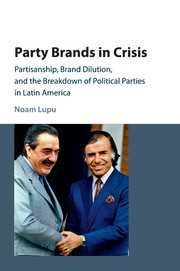 Party Brands in Crisis
Party Brands in Crisis Published online by Cambridge University Press: 18 December 2015
A true national union is always a historical exception and only materializes effectively in dire circumstances.
– Gonzalo Barrios (AD), quoted in El Nacional, January 15, 1985We had to defend the right of the administration to continue to govern or to leave through constitutional means, not because some sergeants take a tank or a warplane.
– Eduardo Fernández (COPEI), personal interview, January 25, 2010Venezuelan democracy reemerged in 1958 following the ouster of military dictator Marcos Pérez Jiménez. Leaders of the country's major political parties returned from exile to contest the first election. The oldest among them, Democratic Action (AD), was also the most powerful. AD had the broadest popular appeal and geographic penetration (Ellner 1982; Martz 1966). The party always saw itself as a multiclass organization even as it developed close ties with organized labor and, at times, the rural peasantry. Party elites often characterized AD as social-democratic; indeed, one of its leaders, Carlos Andrés Pérez, was a three-term vice president of the Socialist International, the global umbrella organization for socialist and social-democratic parties.
For the following four decades, AD's primary rival was the Independent Political Electoral Organizing Committee (COPEI), a party founded by Catholic critics of AD's first governments. COPEI's support was based in the conservative and religious Andean states (Álvarez 2004; Combellas Lares 1985; Herman 1980), the same region that produced the country's military dictators. Supporters considered COPEI a Christian democratic party, and one of its leaders, Eduardo Fernández, served as president of the Christian Democrat International.
Initially, AD and COPEI committed themselves to representative democracy and some informal collaboration in the Pact of Punto Fijo. But that collaboration faded over time, and the two parties came to control stable segments of the electorate. Between 1973 and 1988, AD and COPEI attracted an average of 90 percent of the vote in presidential elections (Figure 5.1).
The remarkable stability of AD and COPEI made Venezuela an exception among Latin American democracies. Some observers credited the parties with buttressing Venezuelan democracy even as democracies across the region broke down in the 1970s. Others criticized their stability and control over organized civil society for undermining political competition and representation (Coppedge 1994; Gil Yepes 1978; Karl 1997; Levine 1973).
Both camps were stunned by the collapse of these established parties in 1998.
To save this book to your Kindle, first ensure no-reply@cambridge.org is added to your Approved Personal Document E-mail List under your Personal Document Settings on the Manage Your Content and Devices page of your Amazon account. Then enter the ‘name’ part of your Kindle email address below. Find out more about saving to your Kindle.
Note you can select to save to either the @free.kindle.com or @kindle.com variations. ‘@free.kindle.com’ emails are free but can only be saved to your device when it is connected to wi-fi. ‘@kindle.com’ emails can be delivered even when you are not connected to wi-fi, but note that service fees apply.
Find out more about the Kindle Personal Document Service.
To save content items to your account, please confirm that you agree to abide by our usage policies. If this is the first time you use this feature, you will be asked to authorise Cambridge Core to connect with your account. Find out more about saving content to Dropbox.
To save content items to your account, please confirm that you agree to abide by our usage policies. If this is the first time you use this feature, you will be asked to authorise Cambridge Core to connect with your account. Find out more about saving content to Google Drive.